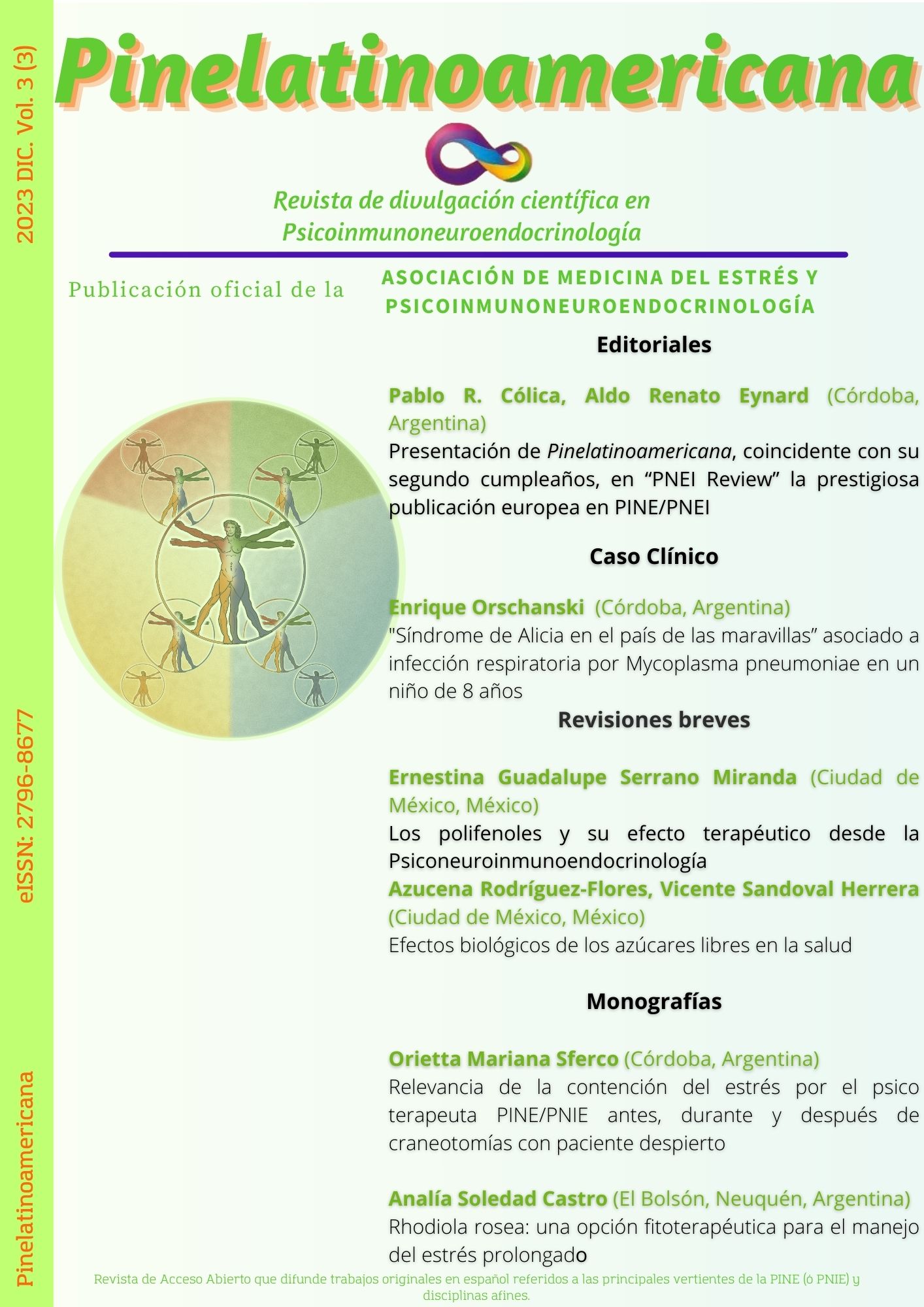Abstract
The role that plants and phytotherapy can play as valid therapeutic options in a Holistic Health Care Model will be discussed. A general description of the phytotherapeutic concept of adaptogen will be showed, taking into account its implication in PINE and Stress. Rhodiola rosea will be described, a native plant from the Northern Hemisphere, an adaptogen widely studied now due to its safety and effectiveness in several conditions related to prolonged stress and associated conditions, including Burnout syndrome. A brief review will show its uses in popular medicine, botanical description, pharmacognosy, mechanisms of action, clinical evidence available to date, dosage and precautions for its use.
References
Amsterdam, J. D. y Panossian, A. G. (2016). Rhodiola rosea L. as a putative botanical antidepressant. Phytomedicine: international journal of phytotherapy and phytopharmacology, 23(7), 770–783. https://doi.org/10.1016/j.phymed.2016.02.009
Anghelescu, I. G., Edwards, D., Seifritz, E. y Kasper, S. (2018). Stress management and the role of Rhodiola rosea: a review. International journal of psychiatry in clinical practice, 22(4), 242–252. https://doi.org/10.1080/13651501.2017.1417442
Castroviejo. S., Aedo, C., Laínz, M., Morales, R., Muñoz Garmendia, F., Nieto Feliner, G. y Paiva, J. (1997). Flora iberica. Plantas vasculares de la Península Ibérica e Islas Baleares. V, Madrid: Real Jardín Botánico, CSIC. https://www.floravascular.com/index.php?spp=Rhodiola%20rosea
Cólica, Pablo R. (2012). Estrés: Lo que Usted querría preguntar y debe conocer. Córdoba: Editorial Brujas, 1era. Ed.
Cólica, Pablo R. (2015). Estrés Manual de Diagnóstico: La explicación psicobiológica de los síntomas. Córdoba: Editorial Brujas, 1era. Ed.
Crellin, J. R. (2008). Rhodiola rosea. https://www.floralimages.co.uk/page.php?taxon=rhodiola_rosea,1
Cropley, M., Banks, A. P. y Boyle, J. (2015). Los efectos del extracto de Rhodiola rosea L. sobre la ansiedad, el estrés, la cognición y otros síntomas del estado de ánimo. Investigación en Fitoterapia, 29 (12), 1934-1939. https://doi.org/10.1002/ptr.5486.
Cunningham, A. B., Li, H. L., Luo, P., Zhao, W. J., Long, X. C. y Brinckmann, J. A. (2020). There "ain't no mountain high enough"?: The drivers, diversity and sustainability of China's Rhodiola trade. Journal of ethnopharmacology, 252, 112379. https://doi.org/10.1016/j.jep.2019.112379
Darbinyan, V., Aslanyan, G., Amroyan, E., Gabrielyan, E., Malmström, C. y Panossian, A. (2007). Ensayo clínico del extracto de Rhodiola rosea L. SHR-5 en el tratamiento de la depresión leve a moderada. Revista Nórdica de Psiquiatría, 61 (5), 343–348. https://doi.org/10.1080/08039480701643290
Darbinyan, V., Kteyan, A., Panossian, A., Gabrielian, E., Wikman, G. y Wagner, H. (2000). Rhodiola rosea en la fatiga inducida por el estrés: un estudio cruzado doble ciego de un extracto estandarizado SHR-5 con un régimen repetido de dosis bajas sobre el rendimiento mental de médicos sanos durante el servicio nocturno. Fitomedicina: Revista Internacional de Fitoterapia y Fitofarmacología, 7(5), 365–371. https://doi.org/10.1016/S0944-7113(00)80055-0.
Edwards, D., Heufelder, A. y Zimmermann, A. (2012). Efectos terapéuticos y seguridad del extracto de Rhodiola rosea WS® 1375 en sujetos con síntomas de estrés vital: resultados de un estudio abierto. Investigación en Fitoterapia, 26(8), 1220-1225. https://doi.org/10.1002/ptr.3712
European Medicines Agency. (2012). Rhodiola rosea L., rhizoma et radix. EMA/HMPC/289537/2012. https://www.ema.europa.eu/en/documents/herbal-summary/arctic-root-summary-public_es.pdf.
Gerontakos, S., Casteleijn, D. y Wardle, J. (2021). Clinician perspectives and understanding of the adaptogenic concept: A focus group study with Naturopaths and Western Herbalists. Integrative medicine research, 10(1), 100433. https://doi.org/10.1016/j.imr.2020.100433
Goyvaerts B. y Bruhn S. (2012). Rhodiola rosea extracto especial SHR-5 en el síndrome de burnout y fatiga. Erfahrungsheilkunde, 61, 79-83. https://doi.org/10.1055/s-0031-1298676
Heldmann, M., Roth, G., Dienel, A. y Münte, T. F. (2016). Impacto del extracto de Rhodiola Rosea WS 1375 en los correlatos electrofisiológicos de la asignación de atención en un paradigma de doble tarea. Neurofisiología Clínica, 127 (9), 290. https://doi.org/10.1016/j.clinph.2016.05.159.
Ivanova Stojcheva, E. y Quintela, J. C. (2022). The Effectiveness of Rhodiola rosea L. Preparations in Alleviating Various Aspects of Life-Stress Symptoms and Stress-Induced Conditions-Encouraging Clinical Evidence. Molecules (Basel, Switzerland), 27(12), 3902. https://doi.org/10.3390/molecules27123902
Kasper, S. y Dienel, A. (2017). Multicenter, open-label, exploratory clinical trial with Rhodiola rosea extract in patients suffering from burnout symptoms. Neuropsychiatric disease and treatment, 13, 889–898. https://doi.org/10.2147/NDT.S120113.
Konstantinos, F. y Heun, R. (2020). The effects of Rhodiola Rosea supplementation on depression, anxiety and mood – A Systematic Review. Global Psychiatry. 3(1). 72-82. https://doi.org/10.2478/gp-2019-0022.
Mao J., Xie S. X., Zee J., Soeller I., Li Q., Rockwell K. y Amsterdam J. D. (2015). Rhodiola rosea versus sertraline for major depressive disorder: A randomized placebo-controlled trial. Phytomedicine, 22 (3), 394-399. https://doi.org/10.1016/j.phymed.2015.01.010.
Marcus A. (2022). Pequeña Guía Verde para acompañar las emociones, El Bolsón, Apuntes para la Ciudadanía.
Olsson, E. M., von Schéele, B. y Panossian, A. G. (2009). A randomised, double-blind, placebo-controlled, parallel-group study of the standardised extract shr-5 of the roots of Rhodiola rosea in the treatment of subjects with stress-related fatigue. Planta medica, 75(2), 105–112. https://doi.org/10.1055/s-0028-1088346
Panossian, A. G., Wagner, H. (2011). Adaptogens: A Review of their history, biological activity, and clinical henefits. Herbalgram. 90. 52-63. https://www.researchgate.net/publication/236462312_Adaptogens_A_Review_of_their_History_Biological_Activity_and_Clinical_Benefits
Risco Rodriguez, E. (2011). Farmacología y clínica de la raíz de rodiola frente al estrés. Revista Fitoterapia. 11(2). 101-117. https://www.fitoterapia.net/php/descargar_documento.php?id=4437&doc_r=sn&num_volumen=29&secc_volumen=5961.
Spasov A. A., Wikman G.K., Mandrikov V.B., Mironova I.A. y Neumoin V.V. (2000). A double-blind, placebo-controlled pilot study of the stimulating and adaptogenic effect of Rhodiola rosea SHR-5 extract on the fatigue of students caused by stress during an examination period with a repeated low-dose regimen. Phytomedicine, 7 (2), 85-89. https://doi.org/10.1016/S0944-7113(00)80078-1.
Suter, S. y Lucock, M. (2017). Xenohormesis: Applying Evolutionary Principles to Contemporary Health Issues. Explor Res Hypothesis Med. 2;2(4):79-85. https://doi.org/10.14218/ERHM.2017.00023.

This work is licensed under a Creative Commons Attribution-NonCommercial 4.0 International License.
Copyright (c) 2023 Pinelatinoamericana

